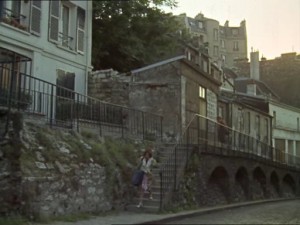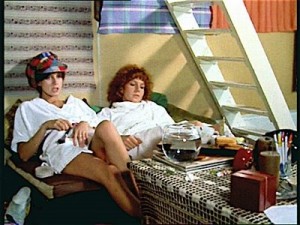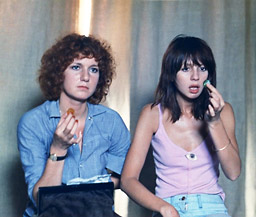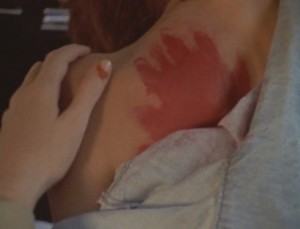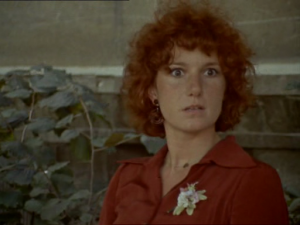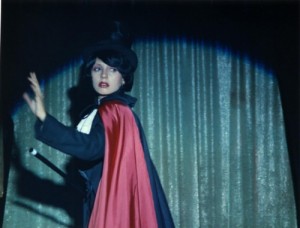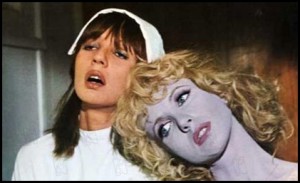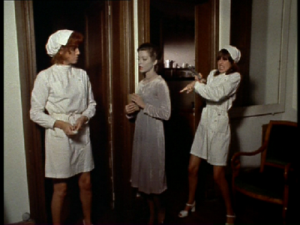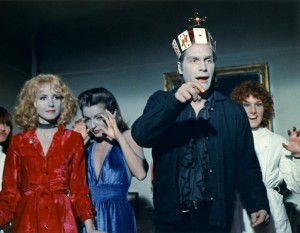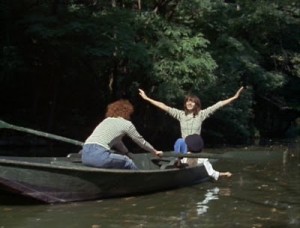From Time Out (London), October 1, 1976. As I point out in my first collection, Placing Movies (1995), my flip comparison of moviegoing and sex in the latter part of this article led Robin Wood in the Times Educational Supplement (22 October 1976) to virtually link me with the downfall of Western civilization: “The implicit trivialization of art and life is the ultimate stage in our alienation.” This was some time before he declared Celine and Julie Go Boating a masterpiece on his own terms, bringing in a feminist perspective that my own appreciation sorely lacked.–- J.R.
The Plot Thickens
I’ve said it before and I’ll say it again: Jacques Rivette is the most important director working in the narrative cinema today. And Celine and Julie Go Boating, while it may not be his most important achievement, is by commonconsent the most enjoyable and accessible of all his movies to date It is also the first of his films to open commercially in England In over a decade. The two movies he has made since, Duelle and Noroît, will both be shown at this year’s London Film Festival — along with Sérail, the first feature by Eduardo de Gregorio, Rivette’s scriptwriter.
Considering the fact that all of Rivette’s most exciting and innovatory work has been made over the past ten years, one might well ask why it has taken so long for any of this work to be released here. The first of the Cahiers du Cinéma critics to embark on filmmaking in the 5Os, Rivette is the one who has adhered most consistently to the category of the director-critic: even though his last piece of published criticism appeared seven years ago, he has remained the most indefatigable moviegoer of his generation, and all his recent work should be seen in this light. ‘Someone like Rivette, who knows the cinema much better than I, shoots little,’ Godard remarked in 1970. ‘If he had made ten films he would have gone a lot further than I.’
Above all, the strange and delightful Celine and Julie Go Boating is a comedy about moviegoing. The endlessly repeated subplot inside a haunted house -– which Celine and Julie simultaneously witness and participate in -– is the precise equivalent of a movie, and their own cockeyed responses to it are the mirror-image of our own responses to the whole experience. The process undergone by them and us is implicitly a sexual one: not only does each girl seem ravished each time she emerges from the house; the giggles, groans, grunts and sighs from each of them as they watch the story (or from us as we watch them) are quite close to the sounds of lovemaking.
To conceive of moviegoing as a conscious mind-fucking is probably necessary to an appreciation of the movie. Without this notion, one has to scamper about looking for clues to what Chris Petit has rightly termed ‘a shaggy dog story’ –- or, more accurately, two shaggy dog stories. All movies, of course, have a touch of the absurd about them. But we usually ‘suspend disbelief,’ pretending that these absurdities don’t exist and that we (in the stalls) don’t exist either, happy participants in an unconscious mind-fuck.
In Celine and Julie, we have to watch ourselves watching, which is where the fun starts. And thanks to Rivette’s richly allusive understanding, the whole history of our common moviegoing experience is paraded before our eyes: cartoons, musical films, horror films, thrillers, Mizoguchi along with Minnelli, Renoir along with Hitchcock.
The Plot
Rivette’s recipe for this cinematic confection is simple. Take two outlandish females –- a librarian (Julie) who’s into Tarot cards and magic, a nightclub magician (Celine) who lies a blue streak –and cross the path of one with the other. Close your eyes, count to ten, and open them. Stew for a bit while Julie (Dominique Labourier) chases Celine (Juliet Berto) through a bright summer’s day in Montmartre, while Celine reciprocates with enticements, provocations and flirtations of her own. If, by this time, one has all the makings of a hare-brained lesbian tale as predictable as the adventures of Alice once she takes off after the White Rabbit, get the two girls working together, in a different style,on another even more outlandish story about two other females.
Give the new story another name –- ‘Phantom Ladies Over Paris’ – and another cast: Bulle Ogier and Marie-France Pisier as Camille and Sophie; Barbet Schroeder (the movie’s producer) as Olivier, the man they’re both scheming to marry; Natalie Asnar as Madlyn, the little girl that Camille and Sophie are scheming separately to murder so they can marry Olivier; and Celine and Julie themselves, who alternate in the role of Madlyn’s nurse. To make things still more demented, have the second story repeated daily inside a haunted house which Celine and Julie take turns visiting; and have each girl forget the story as soon as she emerges –- each time with a piece of candy in her mouth — and remember it again each time she bites into the candy.
Stir well, scramble a bit, and what do you have? Not just two stories for the price of one, but a curious combination that changes the essential nature of both. To pursue the cooking analogy further, each story would probably crumble to pieces before it got out of the oven if it weren’t for the existence of the other. The chemistry of story one plus story two – like the chemistry of Celine and Julie, or Camille plus Sophie, or the whole movie plus the spectator – is thus an essential part of Rivette’s magic recipe.
The Plot Against Rivette
But there’s a problem here. The problem isn’t so much with the public– Celine and Julie was the most popular film at the New York Film Festival two years ago, although it still hasn’t had an American release – but with the games that critics play. According to most Anglo-American critics, there are two kinds of cinema – ‘commercial’ and ‘avant-garde’ –0- each of which is an exclusive category; films that fall between or outside these pigeon-holes are usually swept under the carpet. There’s no one more embarrassed than a critic caught with without a ready-made label to brandish; all he or she can do is ignore the confusing phenomenon and hope it will go away. A lot of interesting cinema gets buried that way. A relatively non-confusing director like Fassbinder who takes over certain Hollywood devices for social agitprop can safely be labeled as ‘subversive’ because he hasn’t really interrogated those devices at all. And the conservative, conformist avant-garde critics who restrict their turf to a list of predictable names –- a social grouping as much as an aesthetic one -– exclude filmmakers who stand outside this golden circle from any recognition at all.
It is commonly agreed in these circuits that Rivette isn’t an avant-garde figure; it is just as commonly agreed in commercial circuits that he isn’t a commercial figure. He’s too new to be labeled; ergo, he doesn’t exist.
On a more basic level, people who have trouble with Celine and Julie usually describe it as silly. They’re right. Moviegoing like sex, is an essentially silly activity –- all the more so when you’re aware that you’re doing it. But that doesn’t prevent it from being a wonderfully delicious activity on occasion. I don’t mind admitting that I’ve seen Celine and Julie seven or eight times over the past two and a half years. A full day of my life has been profitably spent in its presence. If I stopped to calculate all the wasted time I’ve had to spend at movies over the same period –- which is more a total of weeks than days -– I’d be more likely to question the silliness of an entire industry. Celine and Julie Go Boating questions it too -– with a big Cheshire grin.

